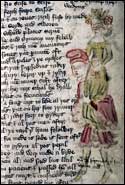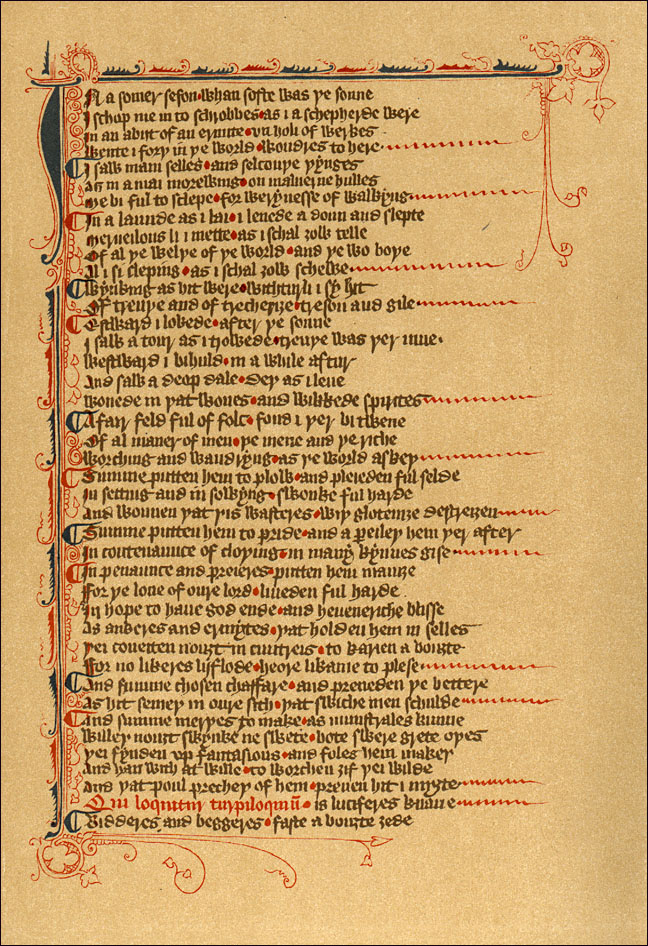Our class text will be William Langland, Piers Plowman, eds. Elizabeth Robertson and Stephen H.A. Shepherd (Norton Critical edition). This facing-page-translation text includes background material in the Norton tradition. You might also want to consult William Langland, Piers Plowman, ed A.V.C. Schmidt (Everyman edition). No facing page translation and squishy notes: this is a less accessible, but more scholarly edition than the Robertson/Shepherd. Other recommended texts are A Companion to Piers Plowman, ed. John A Alford (California, 1988); James Simpson, Piers Plowman: An Introduction, second revised edition (U Exeter Press, 2007); Anna Baldwin, A Guidebook to Piers Plowman (Palgrave, 2007).
 Course description
Course description
The story of English literature may begin with Chaucer's poetry, but fourteenth- and early-fifteenth-century England produced more manuscripts of Piers Plowman than of Chaucer's works. Piers Plowman provides a poetics, including the alliterative long line and allegory, and a politics that is at once royal, Lollard, and agraro-urban to explore issues of individual psychology, social justice, and Christian salvation. The poem minutely examines monarchy, marriage, conscience, sin, and subjectivity itself. Its breadth of interests, depth of inquiry, and manuscript history prevented the poem's appropriation for a literary history that legitimated Lancastrian or, later, Tudor rule. But the poem was claimed as a "proto-Protestant" text in the sole edition (1550) to appear before the Early English Text Society supported W.W. Skeat's editions of three versions (1866-77). The Norton critical edition of the B-text (eds. Elizabeth Robertson and Stephen Shepherd, 2006) will provide our base reading text.
The seminar will situate Langland within what John Bowers calls "the antagonistic tradition" (Chaucer and Langland, Notre Dame, 2008) but also take the full measure of this rich, complex, and deeply-learned poem. Fourteenth-century intellectual and theological debates about kingship, Judaism, the soul, the body, the Eucharist, the active and contemplative lives, and poverty will inform our reading. Besides closely reading the poem and paying some attention to its versions, students will assess the poem's major critical tradition through the analyses of David Aers, James Simpson, Anna Baldwin, Emily Steiner, C. David Benson, Anne Middleton, and Andrew Galloway, among others. See http://www.piersplowman.org/ for more on the International Piers Plowman Society. The site includes searchable bibliography produced by the editors of the Yearbook of Langland Studies, and much else useful for a reader of Piers Plowman.
Requirements
- First assignment due Monday, January 10. A brief exercise in Middle English language You'll choose one word from a list, look it up in the Middle English Dictionary, and write a brief paper (about 600 words) on the word's etymology and meanings. Note subtleties and their effects on your reading of the line cited and, if you wish, on other lines in the Prologue in which the word appears. Due Monday, January 10. See sign-up sheet for words and line references.
- Passus/essay expertise. You'll sign up as "go-to" person for one of our class readings. That means that, while everyone will have read the essay/passus, you'll have dug a little deeper. For instance, you'll have spent more time with the MED, you'll read the "optional" readings, or you'll have found on the Langland online bibliography another article to read. Prepare a handout to distribute. Put your handout on our class's Blackboard site (if you expect others to print your handout before class, please post it to the Blackboard site before 5:00 pm Sunday night). With eight sign-up possibilities and ten students, we'll have two weeks with two experts: Monday, January 31 and Monday, February 7. Completing this assignment counts for 10% of your grade.
- Prospectus, annotated bibliography and topic presentation.The sixth week of class you'll provide the class and me, through Blackboard, a prospectus and annotated bibliography for your term paper (I also ask you to provide me hard copy). Besides the written work, you'll take five minutes of class time to present your thesis. Guidelines for prospectus. The prospectus introduces the question at issue/topic you're treating. It includes the steps of your argument and your methodology. It shows the direction you're taking with your paper, and serves essentially as an outline. As such, it can be as few as 500 words, and as many as 2500 or so. Guidelines for your annotations (with thanks to Prof. Lisa Freinkel). Each annotation should be about 200 words and cite the article or book chapter using accurate MLA documentation style. Avoid summarizing the article. Your goal is to explicate the author's thesis as concisely and clearly as possible. Details of the argument should only be mentioned when they seem necessary for understanding the author's thesis. A good annotation will give a sense of "what's at stake" with the argument. Why is s/he writing this essay? To what critical trend or presumption is s/he responding? Avoid quoting the article. Occasionally a brief quote will be helpful to convey the author's position or his/her tone, but be careful! You want to explicate, not to re-cite. Be especially careful to paraphrase rather than quote directly if your author is using jargon, specialized or highly theoretical terms. Avoid editorializing. Be as neutral as possible. Your goal is not to critique but to explicate. You are presenting an argument - not demonstrating its weakness. You may certainly include essays from class reading among your sources. But please do include other essays too. I would suggest a minimum of five sources. Guidelines for presentation Explain (a) the topic you researched, (b) what you discovered, and (d) its relevance for your program of study. Be concise and organized. In your presentation, do not summarize in detail the essays you've read (we already have your annotations). Rather, your presentation's goal is to help us understand some of the ramifications/implications of your topic for Piers Plowman . Practice your presentation to be sure it's five minutes long.
- Recitation of Middle English. Choose a twenty-or-so-line passage from the poem, practice and perfect your reading of it, and come to my office sometime during the term, before finals week, to read it. Completing this assignment counts for 10% of your grade.
- Term paper. Approximately 4000 to 7500 words. Due Friday, March 11.
